International Accounting: Harmonisation, Issues, and Case Study
VerifiedAdded on 2023/04/22
|11
|3350
|400
AI Summary
This report focuses on the harmonisation of international accounting standards, the reasons behind it, the issues involved, and a case study on the adoption of IFRS in Japan and Toyota Motors. It discusses the benefits of harmonisation, the challenges faced, and the success or failure of the harmonisation process.
Contribute Materials
Your contribution can guide someone’s learning journey. Share your
documents today.
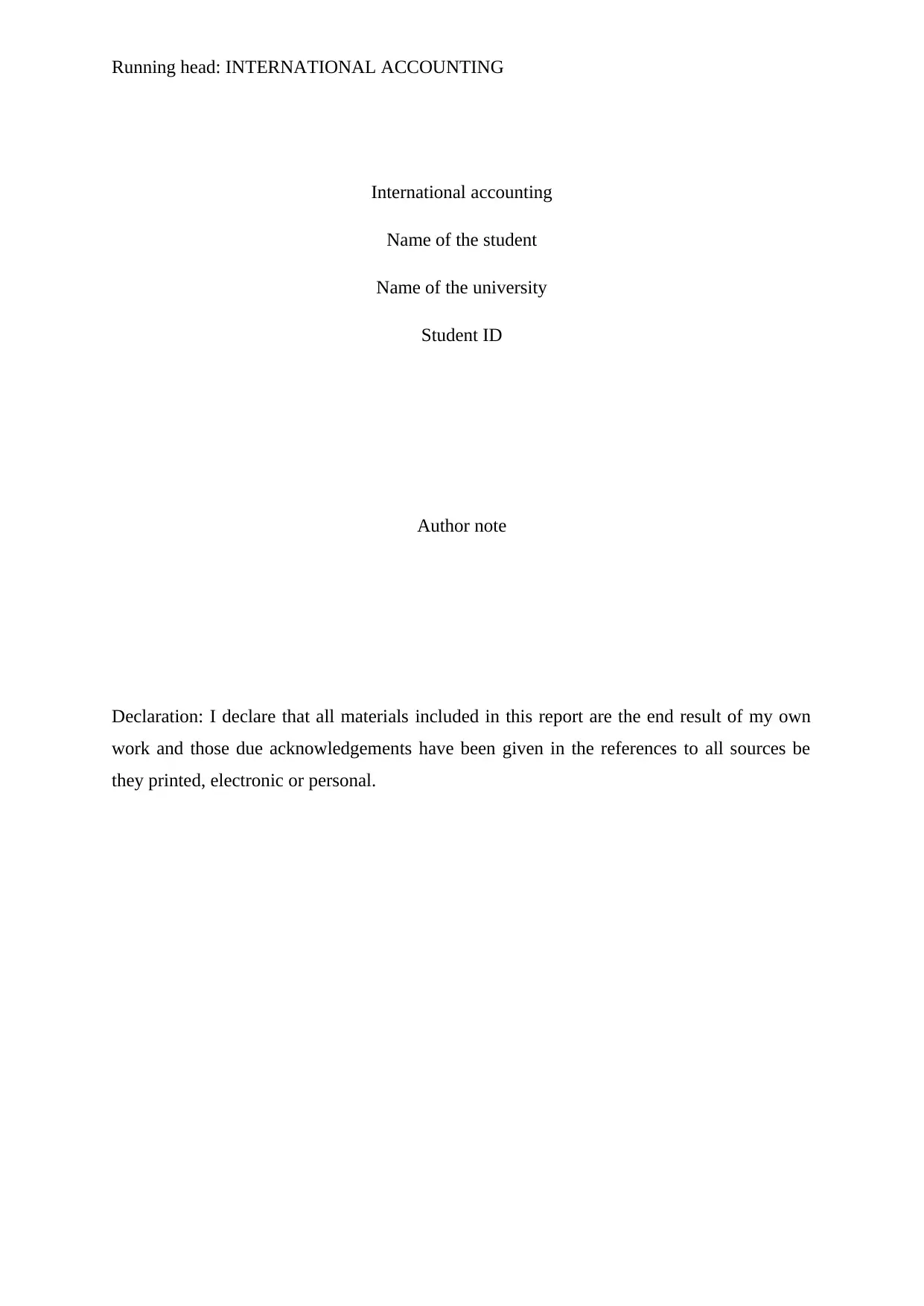
Running head: INTERNATIONAL ACCOUNTING
International accounting
Name of the student
Name of the university
Student ID
Author note
Declaration: I declare that all materials included in this report are the end result of my own
work and those due acknowledgements have been given in the references to all sources be
they printed, electronic or personal.
International accounting
Name of the student
Name of the university
Student ID
Author note
Declaration: I declare that all materials included in this report are the end result of my own
work and those due acknowledgements have been given in the references to all sources be
they printed, electronic or personal.
Secure Best Marks with AI Grader
Need help grading? Try our AI Grader for instant feedback on your assignments.
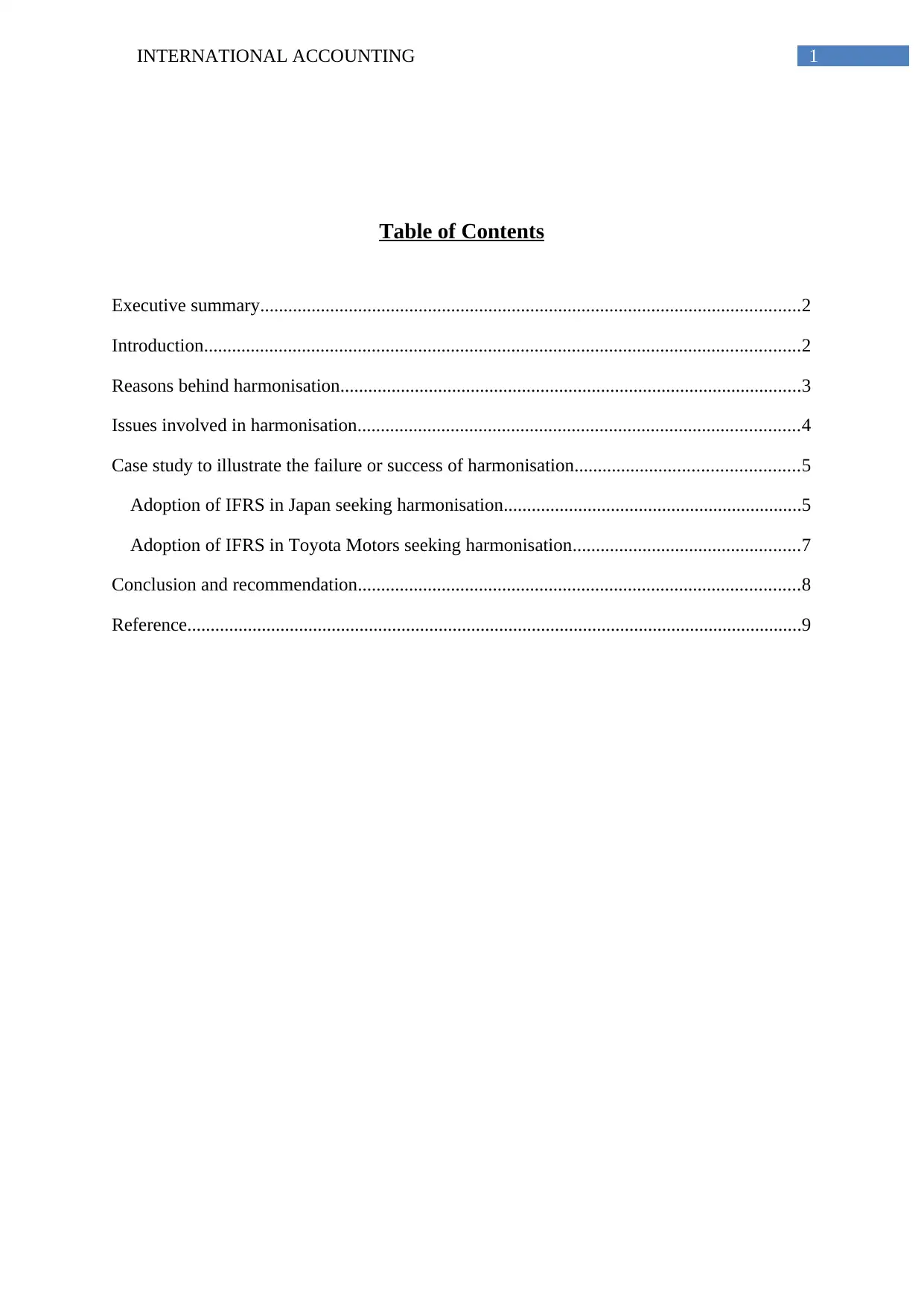
1INTERNATIONAL ACCOUNTING
Table of Contents
Executive summary....................................................................................................................2
Introduction................................................................................................................................2
Reasons behind harmonisation...................................................................................................3
Issues involved in harmonisation...............................................................................................4
Case study to illustrate the failure or success of harmonisation................................................5
Adoption of IFRS in Japan seeking harmonisation................................................................5
Adoption of IFRS in Toyota Motors seeking harmonisation.................................................7
Conclusion and recommendation...............................................................................................8
Reference....................................................................................................................................9
Table of Contents
Executive summary....................................................................................................................2
Introduction................................................................................................................................2
Reasons behind harmonisation...................................................................................................3
Issues involved in harmonisation...............................................................................................4
Case study to illustrate the failure or success of harmonisation................................................5
Adoption of IFRS in Japan seeking harmonisation................................................................5
Adoption of IFRS in Toyota Motors seeking harmonisation.................................................7
Conclusion and recommendation...............................................................................................8
Reference....................................................................................................................................9
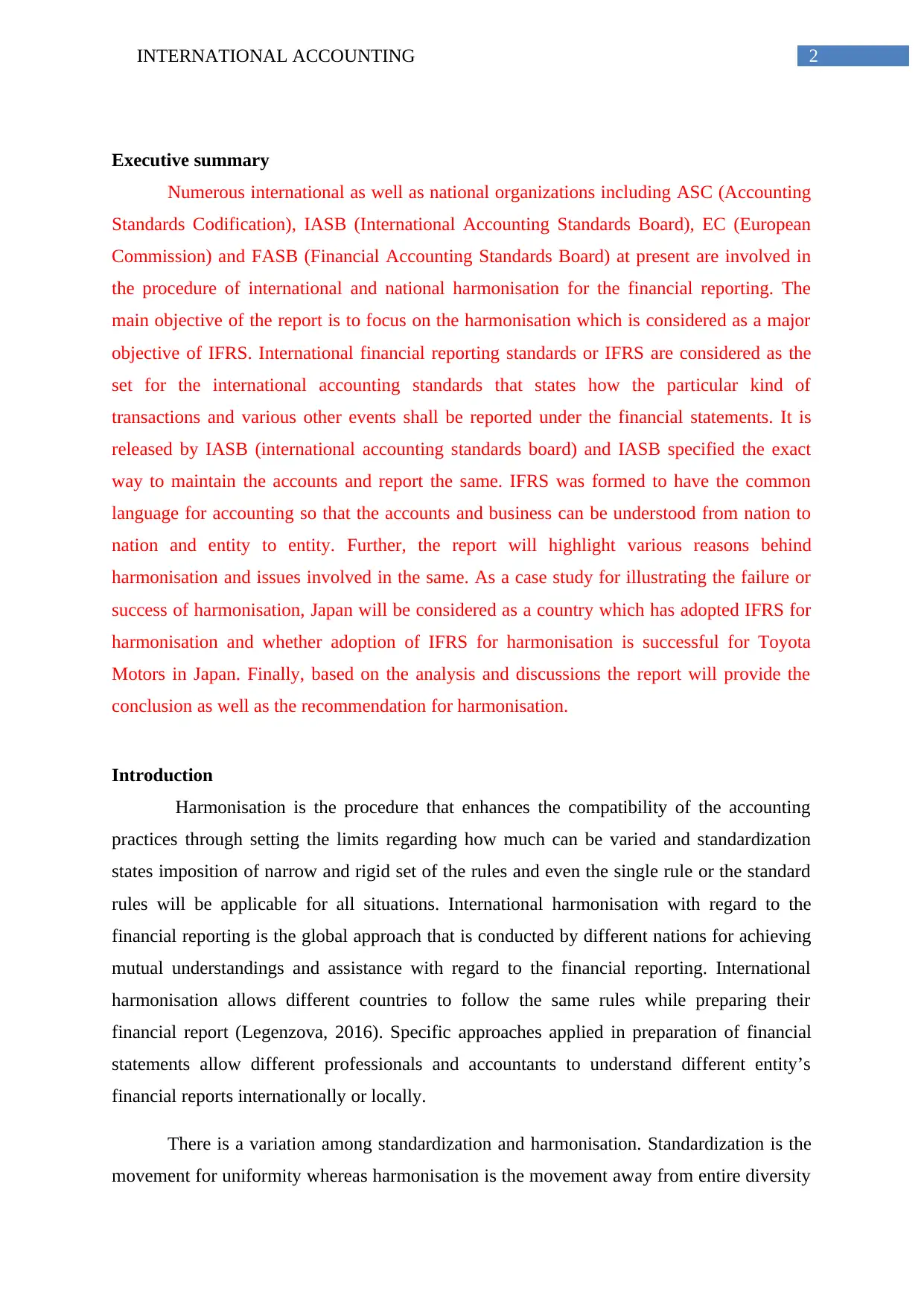
2INTERNATIONAL ACCOUNTING
Executive summary
Numerous international as well as national organizations including ASC (Accounting
Standards Codification), IASB (International Accounting Standards Board), EC (European
Commission) and FASB (Financial Accounting Standards Board) at present are involved in
the procedure of international and national harmonisation for the financial reporting. The
main objective of the report is to focus on the harmonisation which is considered as a major
objective of IFRS. International financial reporting standards or IFRS are considered as the
set for the international accounting standards that states how the particular kind of
transactions and various other events shall be reported under the financial statements. It is
released by IASB (international accounting standards board) and IASB specified the exact
way to maintain the accounts and report the same. IFRS was formed to have the common
language for accounting so that the accounts and business can be understood from nation to
nation and entity to entity. Further, the report will highlight various reasons behind
harmonisation and issues involved in the same. As a case study for illustrating the failure or
success of harmonisation, Japan will be considered as a country which has adopted IFRS for
harmonisation and whether adoption of IFRS for harmonisation is successful for Toyota
Motors in Japan. Finally, based on the analysis and discussions the report will provide the
conclusion as well as the recommendation for harmonisation.
Introduction
Harmonisation is the procedure that enhances the compatibility of the accounting
practices through setting the limits regarding how much can be varied and standardization
states imposition of narrow and rigid set of the rules and even the single rule or the standard
rules will be applicable for all situations. International harmonisation with regard to the
financial reporting is the global approach that is conducted by different nations for achieving
mutual understandings and assistance with regard to the financial reporting. International
harmonisation allows different countries to follow the same rules while preparing their
financial report (Legenzova, 2016). Specific approaches applied in preparation of financial
statements allow different professionals and accountants to understand different entity’s
financial reports internationally or locally.
There is a variation among standardization and harmonisation. Standardization is the
movement for uniformity whereas harmonisation is the movement away from entire diversity
Executive summary
Numerous international as well as national organizations including ASC (Accounting
Standards Codification), IASB (International Accounting Standards Board), EC (European
Commission) and FASB (Financial Accounting Standards Board) at present are involved in
the procedure of international and national harmonisation for the financial reporting. The
main objective of the report is to focus on the harmonisation which is considered as a major
objective of IFRS. International financial reporting standards or IFRS are considered as the
set for the international accounting standards that states how the particular kind of
transactions and various other events shall be reported under the financial statements. It is
released by IASB (international accounting standards board) and IASB specified the exact
way to maintain the accounts and report the same. IFRS was formed to have the common
language for accounting so that the accounts and business can be understood from nation to
nation and entity to entity. Further, the report will highlight various reasons behind
harmonisation and issues involved in the same. As a case study for illustrating the failure or
success of harmonisation, Japan will be considered as a country which has adopted IFRS for
harmonisation and whether adoption of IFRS for harmonisation is successful for Toyota
Motors in Japan. Finally, based on the analysis and discussions the report will provide the
conclusion as well as the recommendation for harmonisation.
Introduction
Harmonisation is the procedure that enhances the compatibility of the accounting
practices through setting the limits regarding how much can be varied and standardization
states imposition of narrow and rigid set of the rules and even the single rule or the standard
rules will be applicable for all situations. International harmonisation with regard to the
financial reporting is the global approach that is conducted by different nations for achieving
mutual understandings and assistance with regard to the financial reporting. International
harmonisation allows different countries to follow the same rules while preparing their
financial report (Legenzova, 2016). Specific approaches applied in preparation of financial
statements allow different professionals and accountants to understand different entity’s
financial reports internationally or locally.
There is a variation among standardization and harmonisation. Standardization is the
movement for uniformity whereas harmonisation is the movement away from entire diversity
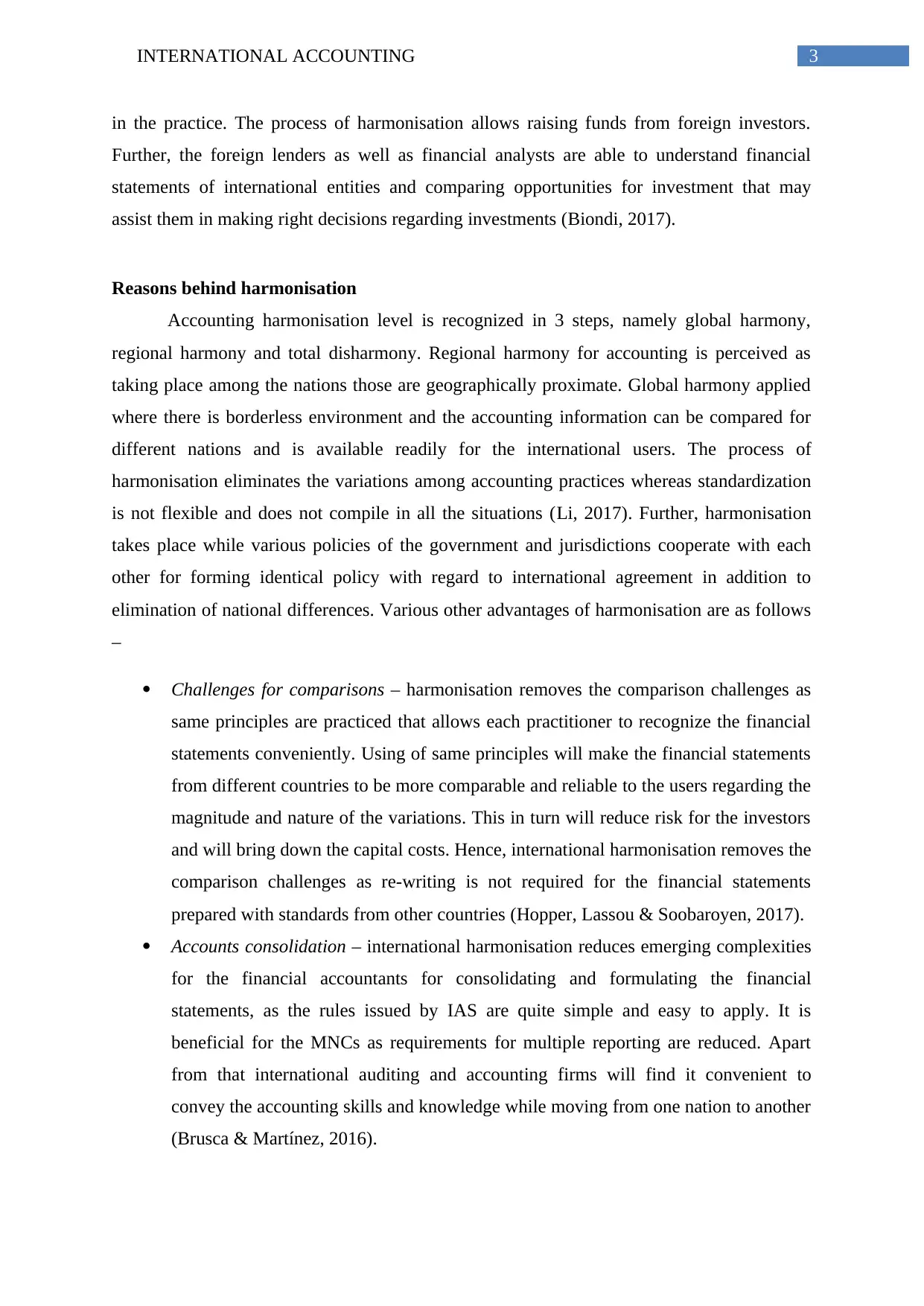
3INTERNATIONAL ACCOUNTING
in the practice. The process of harmonisation allows raising funds from foreign investors.
Further, the foreign lenders as well as financial analysts are able to understand financial
statements of international entities and comparing opportunities for investment that may
assist them in making right decisions regarding investments (Biondi, 2017).
Reasons behind harmonisation
Accounting harmonisation level is recognized in 3 steps, namely global harmony,
regional harmony and total disharmony. Regional harmony for accounting is perceived as
taking place among the nations those are geographically proximate. Global harmony applied
where there is borderless environment and the accounting information can be compared for
different nations and is available readily for the international users. The process of
harmonisation eliminates the variations among accounting practices whereas standardization
is not flexible and does not compile in all the situations (Li, 2017). Further, harmonisation
takes place while various policies of the government and jurisdictions cooperate with each
other for forming identical policy with regard to international agreement in addition to
elimination of national differences. Various other advantages of harmonisation are as follows
–
Challenges for comparisons – harmonisation removes the comparison challenges as
same principles are practiced that allows each practitioner to recognize the financial
statements conveniently. Using of same principles will make the financial statements
from different countries to be more comparable and reliable to the users regarding the
magnitude and nature of the variations. This in turn will reduce risk for the investors
and will bring down the capital costs. Hence, international harmonisation removes the
comparison challenges as re-writing is not required for the financial statements
prepared with standards from other countries (Hopper, Lassou & Soobaroyen, 2017).
Accounts consolidation – international harmonisation reduces emerging complexities
for the financial accountants for consolidating and formulating the financial
statements, as the rules issued by IAS are quite simple and easy to apply. It is
beneficial for the MNCs as requirements for multiple reporting are reduced. Apart
from that international auditing and accounting firms will find it convenient to
convey the accounting skills and knowledge while moving from one nation to another
(Brusca & Martínez, 2016).
in the practice. The process of harmonisation allows raising funds from foreign investors.
Further, the foreign lenders as well as financial analysts are able to understand financial
statements of international entities and comparing opportunities for investment that may
assist them in making right decisions regarding investments (Biondi, 2017).
Reasons behind harmonisation
Accounting harmonisation level is recognized in 3 steps, namely global harmony,
regional harmony and total disharmony. Regional harmony for accounting is perceived as
taking place among the nations those are geographically proximate. Global harmony applied
where there is borderless environment and the accounting information can be compared for
different nations and is available readily for the international users. The process of
harmonisation eliminates the variations among accounting practices whereas standardization
is not flexible and does not compile in all the situations (Li, 2017). Further, harmonisation
takes place while various policies of the government and jurisdictions cooperate with each
other for forming identical policy with regard to international agreement in addition to
elimination of national differences. Various other advantages of harmonisation are as follows
–
Challenges for comparisons – harmonisation removes the comparison challenges as
same principles are practiced that allows each practitioner to recognize the financial
statements conveniently. Using of same principles will make the financial statements
from different countries to be more comparable and reliable to the users regarding the
magnitude and nature of the variations. This in turn will reduce risk for the investors
and will bring down the capital costs. Hence, international harmonisation removes the
comparison challenges as re-writing is not required for the financial statements
prepared with standards from other countries (Hopper, Lassou & Soobaroyen, 2017).
Accounts consolidation – international harmonisation reduces emerging complexities
for the financial accountants for consolidating and formulating the financial
statements, as the rules issued by IAS are quite simple and easy to apply. It is
beneficial for the MNCs as requirements for multiple reporting are reduced. Apart
from that international auditing and accounting firms will find it convenient to
convey the accounting skills and knowledge while moving from one nation to another
(Brusca & Martínez, 2016).
Secure Best Marks with AI Grader
Need help grading? Try our AI Grader for instant feedback on your assignments.
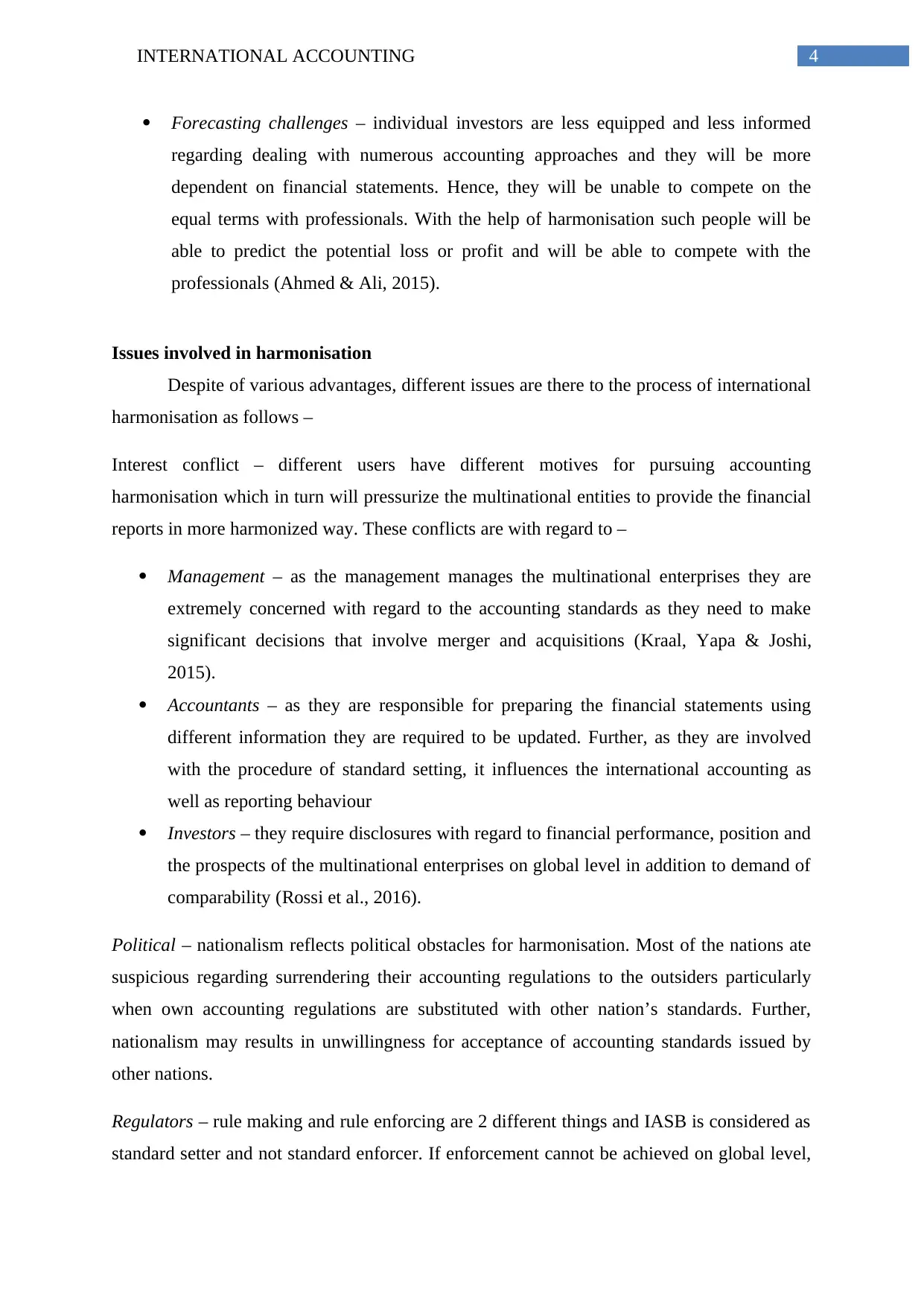
4INTERNATIONAL ACCOUNTING
Forecasting challenges – individual investors are less equipped and less informed
regarding dealing with numerous accounting approaches and they will be more
dependent on financial statements. Hence, they will be unable to compete on the
equal terms with professionals. With the help of harmonisation such people will be
able to predict the potential loss or profit and will be able to compete with the
professionals (Ahmed & Ali, 2015).
Issues involved in harmonisation
Despite of various advantages, different issues are there to the process of international
harmonisation as follows –
Interest conflict – different users have different motives for pursuing accounting
harmonisation which in turn will pressurize the multinational entities to provide the financial
reports in more harmonized way. These conflicts are with regard to –
Management – as the management manages the multinational enterprises they are
extremely concerned with regard to the accounting standards as they need to make
significant decisions that involve merger and acquisitions (Kraal, Yapa & Joshi,
2015).
Accountants – as they are responsible for preparing the financial statements using
different information they are required to be updated. Further, as they are involved
with the procedure of standard setting, it influences the international accounting as
well as reporting behaviour
Investors – they require disclosures with regard to financial performance, position and
the prospects of the multinational enterprises on global level in addition to demand of
comparability (Rossi et al., 2016).
Political – nationalism reflects political obstacles for harmonisation. Most of the nations ate
suspicious regarding surrendering their accounting regulations to the outsiders particularly
when own accounting regulations are substituted with other nation’s standards. Further,
nationalism may results in unwillingness for acceptance of accounting standards issued by
other nations.
Regulators – rule making and rule enforcing are 2 different things and IASB is considered as
standard setter and not standard enforcer. If enforcement cannot be achieved on global level,
Forecasting challenges – individual investors are less equipped and less informed
regarding dealing with numerous accounting approaches and they will be more
dependent on financial statements. Hence, they will be unable to compete on the
equal terms with professionals. With the help of harmonisation such people will be
able to predict the potential loss or profit and will be able to compete with the
professionals (Ahmed & Ali, 2015).
Issues involved in harmonisation
Despite of various advantages, different issues are there to the process of international
harmonisation as follows –
Interest conflict – different users have different motives for pursuing accounting
harmonisation which in turn will pressurize the multinational entities to provide the financial
reports in more harmonized way. These conflicts are with regard to –
Management – as the management manages the multinational enterprises they are
extremely concerned with regard to the accounting standards as they need to make
significant decisions that involve merger and acquisitions (Kraal, Yapa & Joshi,
2015).
Accountants – as they are responsible for preparing the financial statements using
different information they are required to be updated. Further, as they are involved
with the procedure of standard setting, it influences the international accounting as
well as reporting behaviour
Investors – they require disclosures with regard to financial performance, position and
the prospects of the multinational enterprises on global level in addition to demand of
comparability (Rossi et al., 2016).
Political – nationalism reflects political obstacles for harmonisation. Most of the nations ate
suspicious regarding surrendering their accounting regulations to the outsiders particularly
when own accounting regulations are substituted with other nation’s standards. Further,
nationalism may results in unwillingness for acceptance of accounting standards issued by
other nations.
Regulators – rule making and rule enforcing are 2 different things and IASB is considered as
standard setter and not standard enforcer. If enforcement cannot be achieved on global level,
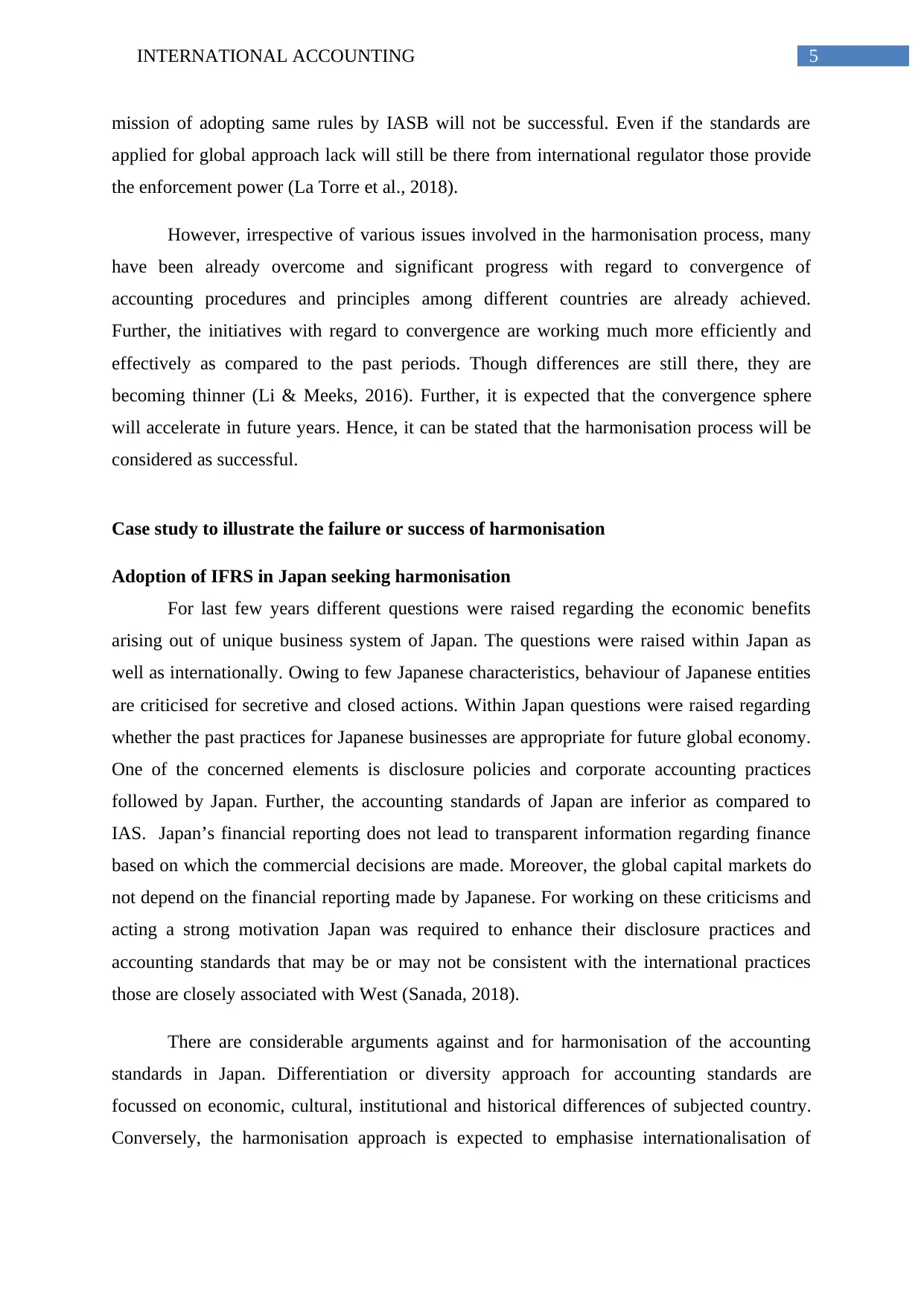
5INTERNATIONAL ACCOUNTING
mission of adopting same rules by IASB will not be successful. Even if the standards are
applied for global approach lack will still be there from international regulator those provide
the enforcement power (La Torre et al., 2018).
However, irrespective of various issues involved in the harmonisation process, many
have been already overcome and significant progress with regard to convergence of
accounting procedures and principles among different countries are already achieved.
Further, the initiatives with regard to convergence are working much more efficiently and
effectively as compared to the past periods. Though differences are still there, they are
becoming thinner (Li & Meeks, 2016). Further, it is expected that the convergence sphere
will accelerate in future years. Hence, it can be stated that the harmonisation process will be
considered as successful.
Case study to illustrate the failure or success of harmonisation
Adoption of IFRS in Japan seeking harmonisation
For last few years different questions were raised regarding the economic benefits
arising out of unique business system of Japan. The questions were raised within Japan as
well as internationally. Owing to few Japanese characteristics, behaviour of Japanese entities
are criticised for secretive and closed actions. Within Japan questions were raised regarding
whether the past practices for Japanese businesses are appropriate for future global economy.
One of the concerned elements is disclosure policies and corporate accounting practices
followed by Japan. Further, the accounting standards of Japan are inferior as compared to
IAS. Japan’s financial reporting does not lead to transparent information regarding finance
based on which the commercial decisions are made. Moreover, the global capital markets do
not depend on the financial reporting made by Japanese. For working on these criticisms and
acting a strong motivation Japan was required to enhance their disclosure practices and
accounting standards that may be or may not be consistent with the international practices
those are closely associated with West (Sanada, 2018).
There are considerable arguments against and for harmonisation of the accounting
standards in Japan. Differentiation or diversity approach for accounting standards are
focussed on economic, cultural, institutional and historical differences of subjected country.
Conversely, the harmonisation approach is expected to emphasise internationalisation of
mission of adopting same rules by IASB will not be successful. Even if the standards are
applied for global approach lack will still be there from international regulator those provide
the enforcement power (La Torre et al., 2018).
However, irrespective of various issues involved in the harmonisation process, many
have been already overcome and significant progress with regard to convergence of
accounting procedures and principles among different countries are already achieved.
Further, the initiatives with regard to convergence are working much more efficiently and
effectively as compared to the past periods. Though differences are still there, they are
becoming thinner (Li & Meeks, 2016). Further, it is expected that the convergence sphere
will accelerate in future years. Hence, it can be stated that the harmonisation process will be
considered as successful.
Case study to illustrate the failure or success of harmonisation
Adoption of IFRS in Japan seeking harmonisation
For last few years different questions were raised regarding the economic benefits
arising out of unique business system of Japan. The questions were raised within Japan as
well as internationally. Owing to few Japanese characteristics, behaviour of Japanese entities
are criticised for secretive and closed actions. Within Japan questions were raised regarding
whether the past practices for Japanese businesses are appropriate for future global economy.
One of the concerned elements is disclosure policies and corporate accounting practices
followed by Japan. Further, the accounting standards of Japan are inferior as compared to
IAS. Japan’s financial reporting does not lead to transparent information regarding finance
based on which the commercial decisions are made. Moreover, the global capital markets do
not depend on the financial reporting made by Japanese. For working on these criticisms and
acting a strong motivation Japan was required to enhance their disclosure practices and
accounting standards that may be or may not be consistent with the international practices
those are closely associated with West (Sanada, 2018).
There are considerable arguments against and for harmonisation of the accounting
standards in Japan. Differentiation or diversity approach for accounting standards are
focussed on economic, cultural, institutional and historical differences of subjected country.
Conversely, the harmonisation approach is expected to emphasise internationalisation of
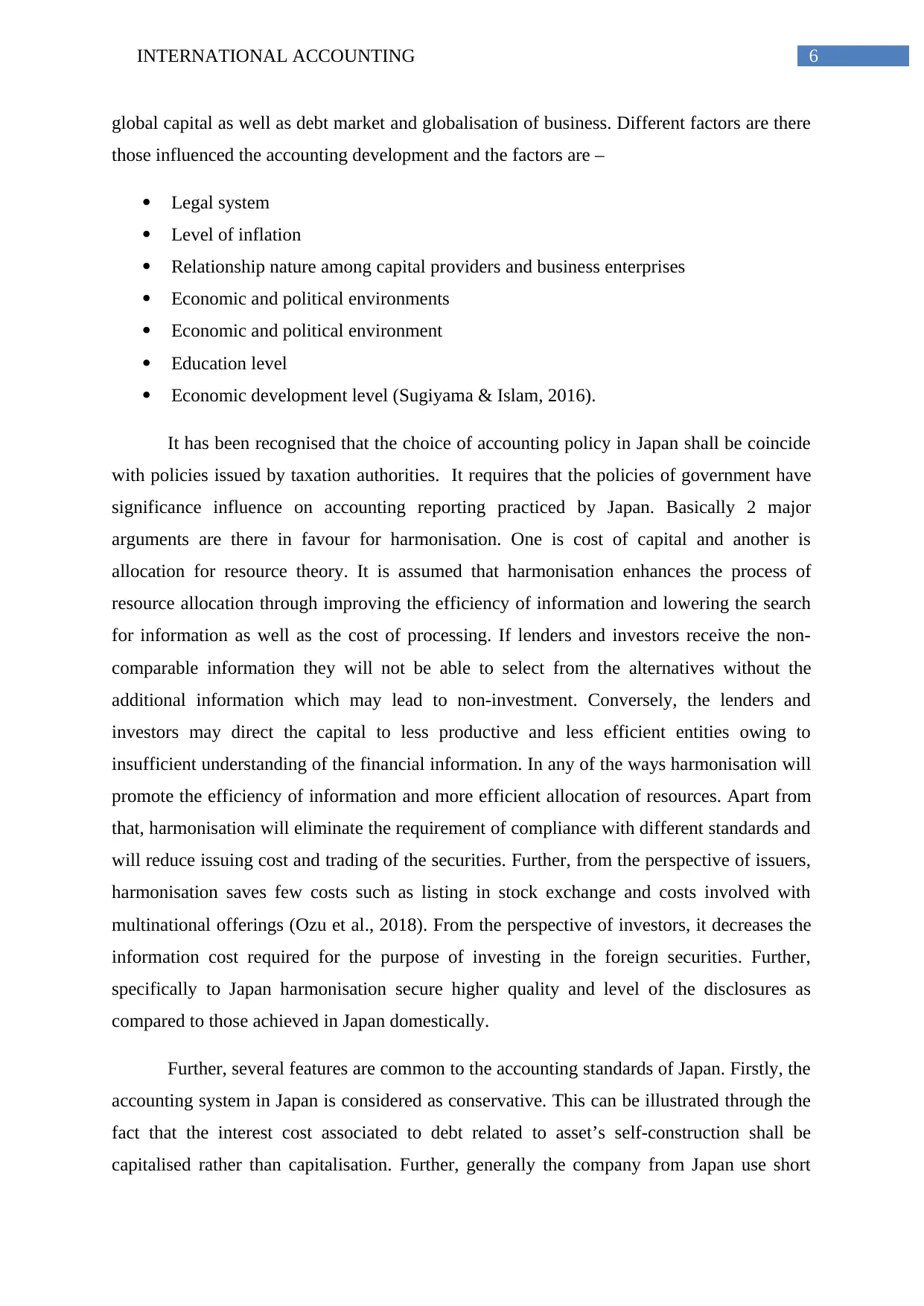
6INTERNATIONAL ACCOUNTING
global capital as well as debt market and globalisation of business. Different factors are there
those influenced the accounting development and the factors are –
Legal system
Level of inflation
Relationship nature among capital providers and business enterprises
Economic and political environments
Economic and political environment
Education level
Economic development level (Sugiyama & Islam, 2016).
It has been recognised that the choice of accounting policy in Japan shall be coincide
with policies issued by taxation authorities. It requires that the policies of government have
significance influence on accounting reporting practiced by Japan. Basically 2 major
arguments are there in favour for harmonisation. One is cost of capital and another is
allocation for resource theory. It is assumed that harmonisation enhances the process of
resource allocation through improving the efficiency of information and lowering the search
for information as well as the cost of processing. If lenders and investors receive the non-
comparable information they will not be able to select from the alternatives without the
additional information which may lead to non-investment. Conversely, the lenders and
investors may direct the capital to less productive and less efficient entities owing to
insufficient understanding of the financial information. In any of the ways harmonisation will
promote the efficiency of information and more efficient allocation of resources. Apart from
that, harmonisation will eliminate the requirement of compliance with different standards and
will reduce issuing cost and trading of the securities. Further, from the perspective of issuers,
harmonisation saves few costs such as listing in stock exchange and costs involved with
multinational offerings (Ozu et al., 2018). From the perspective of investors, it decreases the
information cost required for the purpose of investing in the foreign securities. Further,
specifically to Japan harmonisation secure higher quality and level of the disclosures as
compared to those achieved in Japan domestically.
Further, several features are common to the accounting standards of Japan. Firstly, the
accounting system in Japan is considered as conservative. This can be illustrated through the
fact that the interest cost associated to debt related to asset’s self-construction shall be
capitalised rather than capitalisation. Further, generally the company from Japan use short
global capital as well as debt market and globalisation of business. Different factors are there
those influenced the accounting development and the factors are –
Legal system
Level of inflation
Relationship nature among capital providers and business enterprises
Economic and political environments
Economic and political environment
Education level
Economic development level (Sugiyama & Islam, 2016).
It has been recognised that the choice of accounting policy in Japan shall be coincide
with policies issued by taxation authorities. It requires that the policies of government have
significance influence on accounting reporting practiced by Japan. Basically 2 major
arguments are there in favour for harmonisation. One is cost of capital and another is
allocation for resource theory. It is assumed that harmonisation enhances the process of
resource allocation through improving the efficiency of information and lowering the search
for information as well as the cost of processing. If lenders and investors receive the non-
comparable information they will not be able to select from the alternatives without the
additional information which may lead to non-investment. Conversely, the lenders and
investors may direct the capital to less productive and less efficient entities owing to
insufficient understanding of the financial information. In any of the ways harmonisation will
promote the efficiency of information and more efficient allocation of resources. Apart from
that, harmonisation will eliminate the requirement of compliance with different standards and
will reduce issuing cost and trading of the securities. Further, from the perspective of issuers,
harmonisation saves few costs such as listing in stock exchange and costs involved with
multinational offerings (Ozu et al., 2018). From the perspective of investors, it decreases the
information cost required for the purpose of investing in the foreign securities. Further,
specifically to Japan harmonisation secure higher quality and level of the disclosures as
compared to those achieved in Japan domestically.
Further, several features are common to the accounting standards of Japan. Firstly, the
accounting system in Japan is considered as conservative. This can be illustrated through the
fact that the interest cost associated to debt related to asset’s self-construction shall be
capitalised rather than capitalisation. Further, generally the company from Japan use short
Paraphrase This Document
Need a fresh take? Get an instant paraphrase of this document with our AI Paraphraser
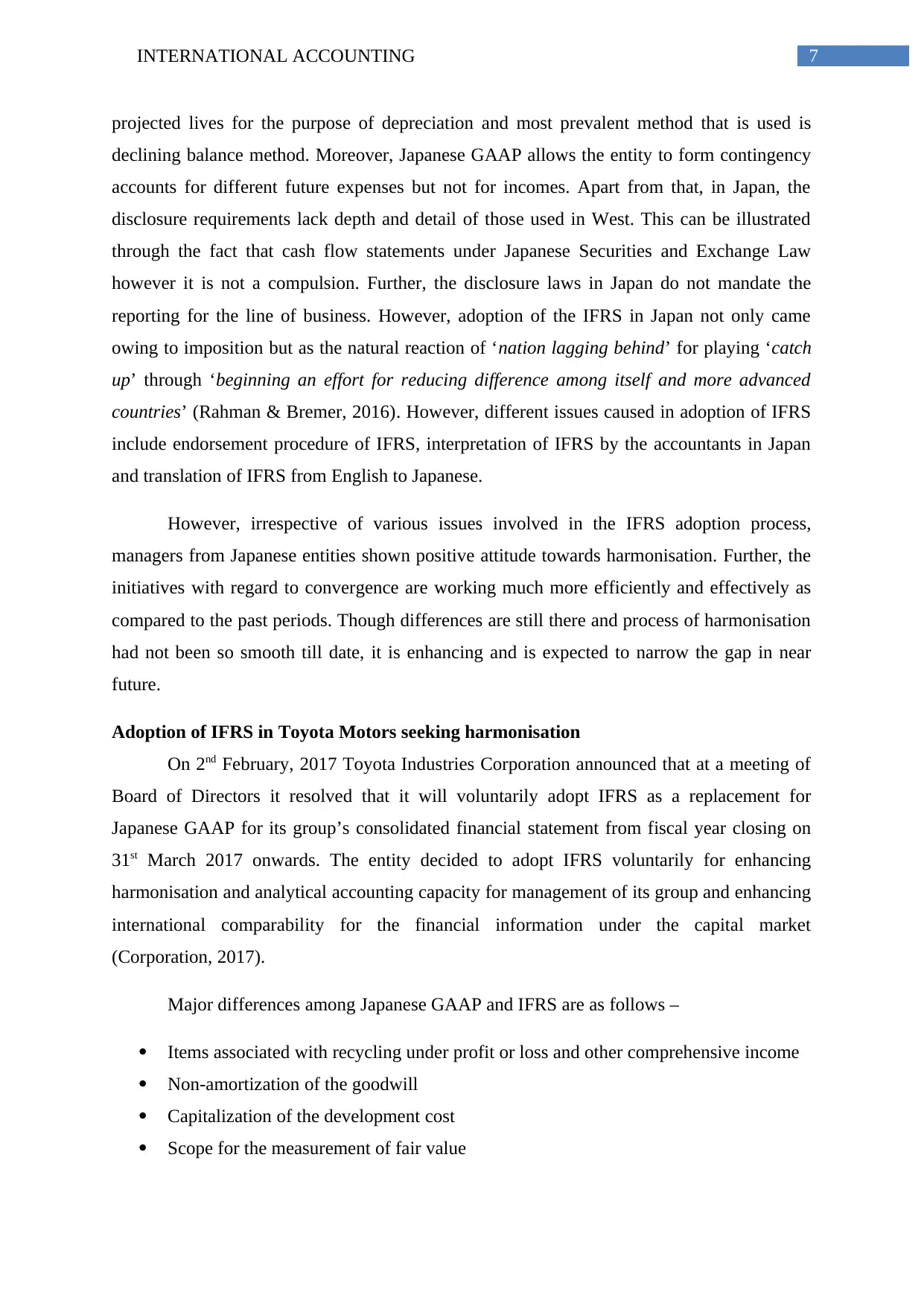
7INTERNATIONAL ACCOUNTING
projected lives for the purpose of depreciation and most prevalent method that is used is
declining balance method. Moreover, Japanese GAAP allows the entity to form contingency
accounts for different future expenses but not for incomes. Apart from that, in Japan, the
disclosure requirements lack depth and detail of those used in West. This can be illustrated
through the fact that cash flow statements under Japanese Securities and Exchange Law
however it is not a compulsion. Further, the disclosure laws in Japan do not mandate the
reporting for the line of business. However, adoption of the IFRS in Japan not only came
owing to imposition but as the natural reaction of ‘nation lagging behind’ for playing ‘catch
up’ through ‘beginning an effort for reducing difference among itself and more advanced
countries’ (Rahman & Bremer, 2016). However, different issues caused in adoption of IFRS
include endorsement procedure of IFRS, interpretation of IFRS by the accountants in Japan
and translation of IFRS from English to Japanese.
However, irrespective of various issues involved in the IFRS adoption process,
managers from Japanese entities shown positive attitude towards harmonisation. Further, the
initiatives with regard to convergence are working much more efficiently and effectively as
compared to the past periods. Though differences are still there and process of harmonisation
had not been so smooth till date, it is enhancing and is expected to narrow the gap in near
future.
Adoption of IFRS in Toyota Motors seeking harmonisation
On 2nd February, 2017 Toyota Industries Corporation announced that at a meeting of
Board of Directors it resolved that it will voluntarily adopt IFRS as a replacement for
Japanese GAAP for its group’s consolidated financial statement from fiscal year closing on
31st March 2017 onwards. The entity decided to adopt IFRS voluntarily for enhancing
harmonisation and analytical accounting capacity for management of its group and enhancing
international comparability for the financial information under the capital market
(Corporation, 2017).
Major differences among Japanese GAAP and IFRS are as follows –
Items associated with recycling under profit or loss and other comprehensive income
Non-amortization of the goodwill
Capitalization of the development cost
Scope for the measurement of fair value
projected lives for the purpose of depreciation and most prevalent method that is used is
declining balance method. Moreover, Japanese GAAP allows the entity to form contingency
accounts for different future expenses but not for incomes. Apart from that, in Japan, the
disclosure requirements lack depth and detail of those used in West. This can be illustrated
through the fact that cash flow statements under Japanese Securities and Exchange Law
however it is not a compulsion. Further, the disclosure laws in Japan do not mandate the
reporting for the line of business. However, adoption of the IFRS in Japan not only came
owing to imposition but as the natural reaction of ‘nation lagging behind’ for playing ‘catch
up’ through ‘beginning an effort for reducing difference among itself and more advanced
countries’ (Rahman & Bremer, 2016). However, different issues caused in adoption of IFRS
include endorsement procedure of IFRS, interpretation of IFRS by the accountants in Japan
and translation of IFRS from English to Japanese.
However, irrespective of various issues involved in the IFRS adoption process,
managers from Japanese entities shown positive attitude towards harmonisation. Further, the
initiatives with regard to convergence are working much more efficiently and effectively as
compared to the past periods. Though differences are still there and process of harmonisation
had not been so smooth till date, it is enhancing and is expected to narrow the gap in near
future.
Adoption of IFRS in Toyota Motors seeking harmonisation
On 2nd February, 2017 Toyota Industries Corporation announced that at a meeting of
Board of Directors it resolved that it will voluntarily adopt IFRS as a replacement for
Japanese GAAP for its group’s consolidated financial statement from fiscal year closing on
31st March 2017 onwards. The entity decided to adopt IFRS voluntarily for enhancing
harmonisation and analytical accounting capacity for management of its group and enhancing
international comparability for the financial information under the capital market
(Corporation, 2017).
Major differences among Japanese GAAP and IFRS are as follows –
Items associated with recycling under profit or loss and other comprehensive income
Non-amortization of the goodwill
Capitalization of the development cost
Scope for the measurement of fair value
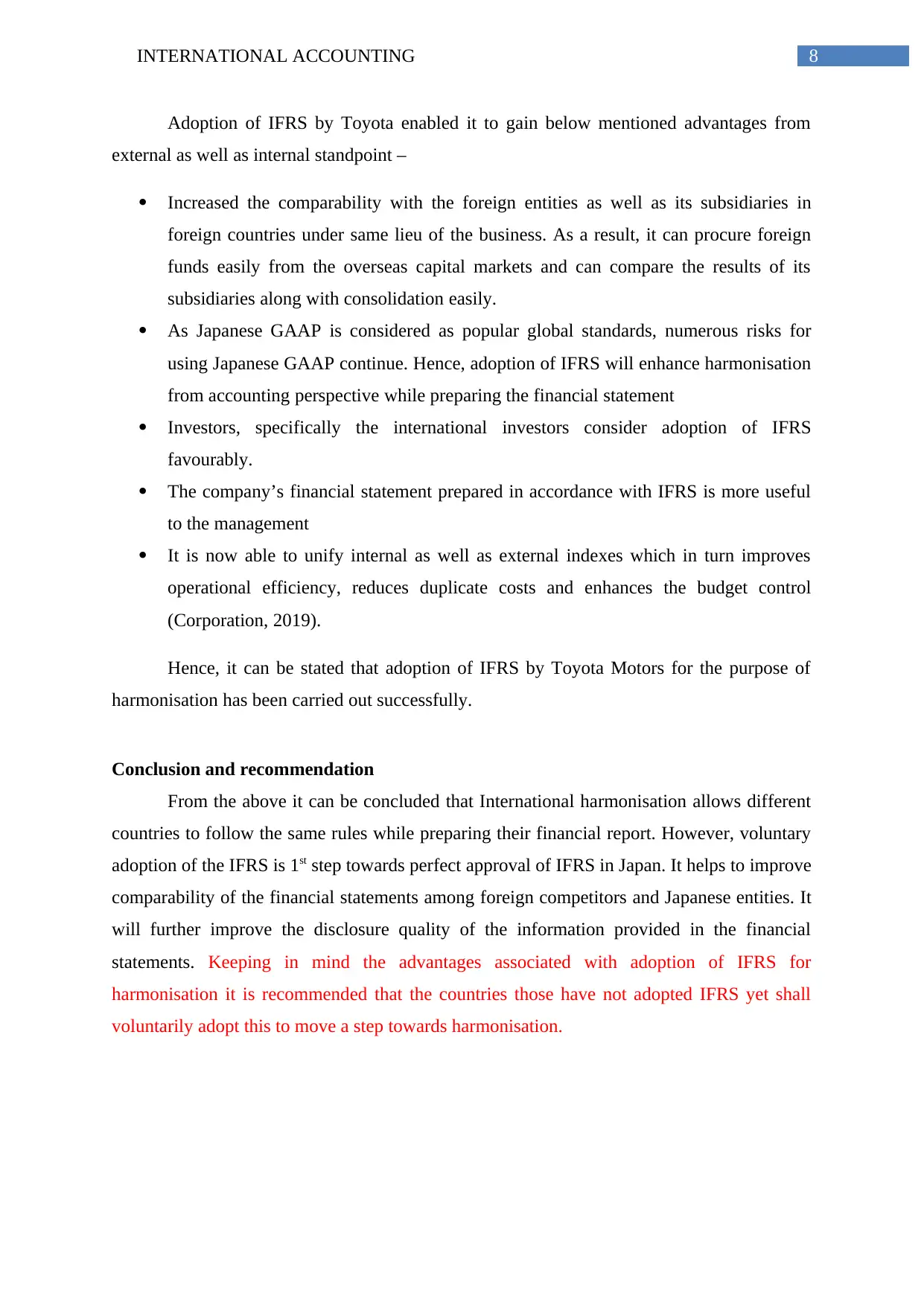
8INTERNATIONAL ACCOUNTING
Adoption of IFRS by Toyota enabled it to gain below mentioned advantages from
external as well as internal standpoint –
Increased the comparability with the foreign entities as well as its subsidiaries in
foreign countries under same lieu of the business. As a result, it can procure foreign
funds easily from the overseas capital markets and can compare the results of its
subsidiaries along with consolidation easily.
As Japanese GAAP is considered as popular global standards, numerous risks for
using Japanese GAAP continue. Hence, adoption of IFRS will enhance harmonisation
from accounting perspective while preparing the financial statement
Investors, specifically the international investors consider adoption of IFRS
favourably.
The company’s financial statement prepared in accordance with IFRS is more useful
to the management
It is now able to unify internal as well as external indexes which in turn improves
operational efficiency, reduces duplicate costs and enhances the budget control
(Corporation, 2019).
Hence, it can be stated that adoption of IFRS by Toyota Motors for the purpose of
harmonisation has been carried out successfully.
Conclusion and recommendation
From the above it can be concluded that International harmonisation allows different
countries to follow the same rules while preparing their financial report. However, voluntary
adoption of the IFRS is 1st step towards perfect approval of IFRS in Japan. It helps to improve
comparability of the financial statements among foreign competitors and Japanese entities. It
will further improve the disclosure quality of the information provided in the financial
statements. Keeping in mind the advantages associated with adoption of IFRS for
harmonisation it is recommended that the countries those have not adopted IFRS yet shall
voluntarily adopt this to move a step towards harmonisation.
Adoption of IFRS by Toyota enabled it to gain below mentioned advantages from
external as well as internal standpoint –
Increased the comparability with the foreign entities as well as its subsidiaries in
foreign countries under same lieu of the business. As a result, it can procure foreign
funds easily from the overseas capital markets and can compare the results of its
subsidiaries along with consolidation easily.
As Japanese GAAP is considered as popular global standards, numerous risks for
using Japanese GAAP continue. Hence, adoption of IFRS will enhance harmonisation
from accounting perspective while preparing the financial statement
Investors, specifically the international investors consider adoption of IFRS
favourably.
The company’s financial statement prepared in accordance with IFRS is more useful
to the management
It is now able to unify internal as well as external indexes which in turn improves
operational efficiency, reduces duplicate costs and enhances the budget control
(Corporation, 2019).
Hence, it can be stated that adoption of IFRS by Toyota Motors for the purpose of
harmonisation has been carried out successfully.
Conclusion and recommendation
From the above it can be concluded that International harmonisation allows different
countries to follow the same rules while preparing their financial report. However, voluntary
adoption of the IFRS is 1st step towards perfect approval of IFRS in Japan. It helps to improve
comparability of the financial statements among foreign competitors and Japanese entities. It
will further improve the disclosure quality of the information provided in the financial
statements. Keeping in mind the advantages associated with adoption of IFRS for
harmonisation it is recommended that the countries those have not adopted IFRS yet shall
voluntarily adopt this to move a step towards harmonisation.
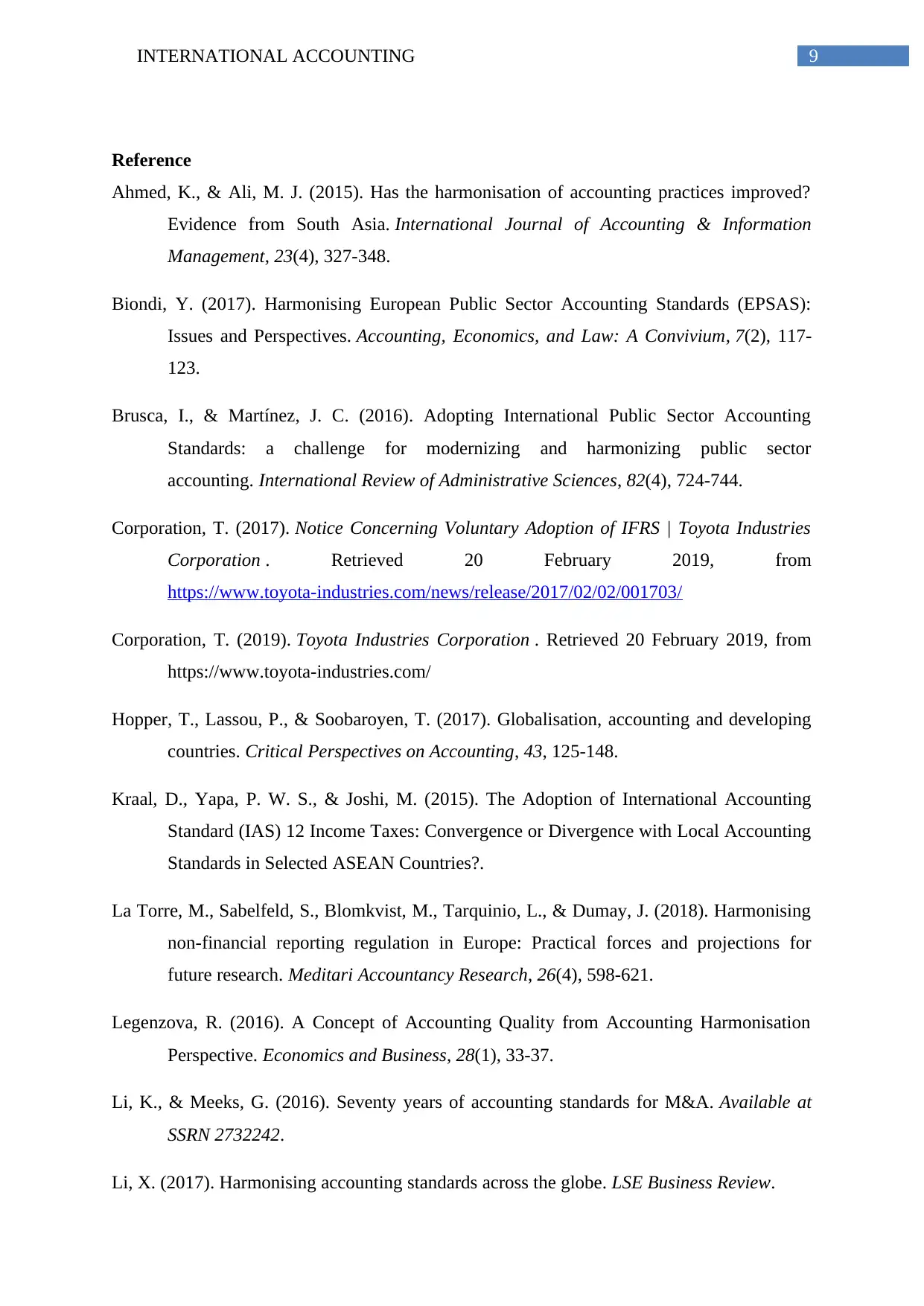
9INTERNATIONAL ACCOUNTING
Reference
Ahmed, K., & Ali, M. J. (2015). Has the harmonisation of accounting practices improved?
Evidence from South Asia. International Journal of Accounting & Information
Management, 23(4), 327-348.
Biondi, Y. (2017). Harmonising European Public Sector Accounting Standards (EPSAS):
Issues and Perspectives. Accounting, Economics, and Law: A Convivium, 7(2), 117-
123.
Brusca, I., & Martínez, J. C. (2016). Adopting International Public Sector Accounting
Standards: a challenge for modernizing and harmonizing public sector
accounting. International Review of Administrative Sciences, 82(4), 724-744.
Corporation, T. (2017). Notice Concerning Voluntary Adoption of IFRS | Toyota Industries
Corporation . Retrieved 20 February 2019, from
https://www.toyota-industries.com/news/release/2017/02/02/001703/
Corporation, T. (2019). Toyota Industries Corporation . Retrieved 20 February 2019, from
https://www.toyota-industries.com/
Hopper, T., Lassou, P., & Soobaroyen, T. (2017). Globalisation, accounting and developing
countries. Critical Perspectives on Accounting, 43, 125-148.
Kraal, D., Yapa, P. W. S., & Joshi, M. (2015). The Adoption of International Accounting
Standard (IAS) 12 Income Taxes: Convergence or Divergence with Local Accounting
Standards in Selected ASEAN Countries?.
La Torre, M., Sabelfeld, S., Blomkvist, M., Tarquinio, L., & Dumay, J. (2018). Harmonising
non-financial reporting regulation in Europe: Practical forces and projections for
future research. Meditari Accountancy Research, 26(4), 598-621.
Legenzova, R. (2016). A Concept of Accounting Quality from Accounting Harmonisation
Perspective. Economics and Business, 28(1), 33-37.
Li, K., & Meeks, G. (2016). Seventy years of accounting standards for M&A. Available at
SSRN 2732242.
Li, X. (2017). Harmonising accounting standards across the globe. LSE Business Review.
Reference
Ahmed, K., & Ali, M. J. (2015). Has the harmonisation of accounting practices improved?
Evidence from South Asia. International Journal of Accounting & Information
Management, 23(4), 327-348.
Biondi, Y. (2017). Harmonising European Public Sector Accounting Standards (EPSAS):
Issues and Perspectives. Accounting, Economics, and Law: A Convivium, 7(2), 117-
123.
Brusca, I., & Martínez, J. C. (2016). Adopting International Public Sector Accounting
Standards: a challenge for modernizing and harmonizing public sector
accounting. International Review of Administrative Sciences, 82(4), 724-744.
Corporation, T. (2017). Notice Concerning Voluntary Adoption of IFRS | Toyota Industries
Corporation . Retrieved 20 February 2019, from
https://www.toyota-industries.com/news/release/2017/02/02/001703/
Corporation, T. (2019). Toyota Industries Corporation . Retrieved 20 February 2019, from
https://www.toyota-industries.com/
Hopper, T., Lassou, P., & Soobaroyen, T. (2017). Globalisation, accounting and developing
countries. Critical Perspectives on Accounting, 43, 125-148.
Kraal, D., Yapa, P. W. S., & Joshi, M. (2015). The Adoption of International Accounting
Standard (IAS) 12 Income Taxes: Convergence or Divergence with Local Accounting
Standards in Selected ASEAN Countries?.
La Torre, M., Sabelfeld, S., Blomkvist, M., Tarquinio, L., & Dumay, J. (2018). Harmonising
non-financial reporting regulation in Europe: Practical forces and projections for
future research. Meditari Accountancy Research, 26(4), 598-621.
Legenzova, R. (2016). A Concept of Accounting Quality from Accounting Harmonisation
Perspective. Economics and Business, 28(1), 33-37.
Li, K., & Meeks, G. (2016). Seventy years of accounting standards for M&A. Available at
SSRN 2732242.
Li, X. (2017). Harmonising accounting standards across the globe. LSE Business Review.
Secure Best Marks with AI Grader
Need help grading? Try our AI Grader for instant feedback on your assignments.
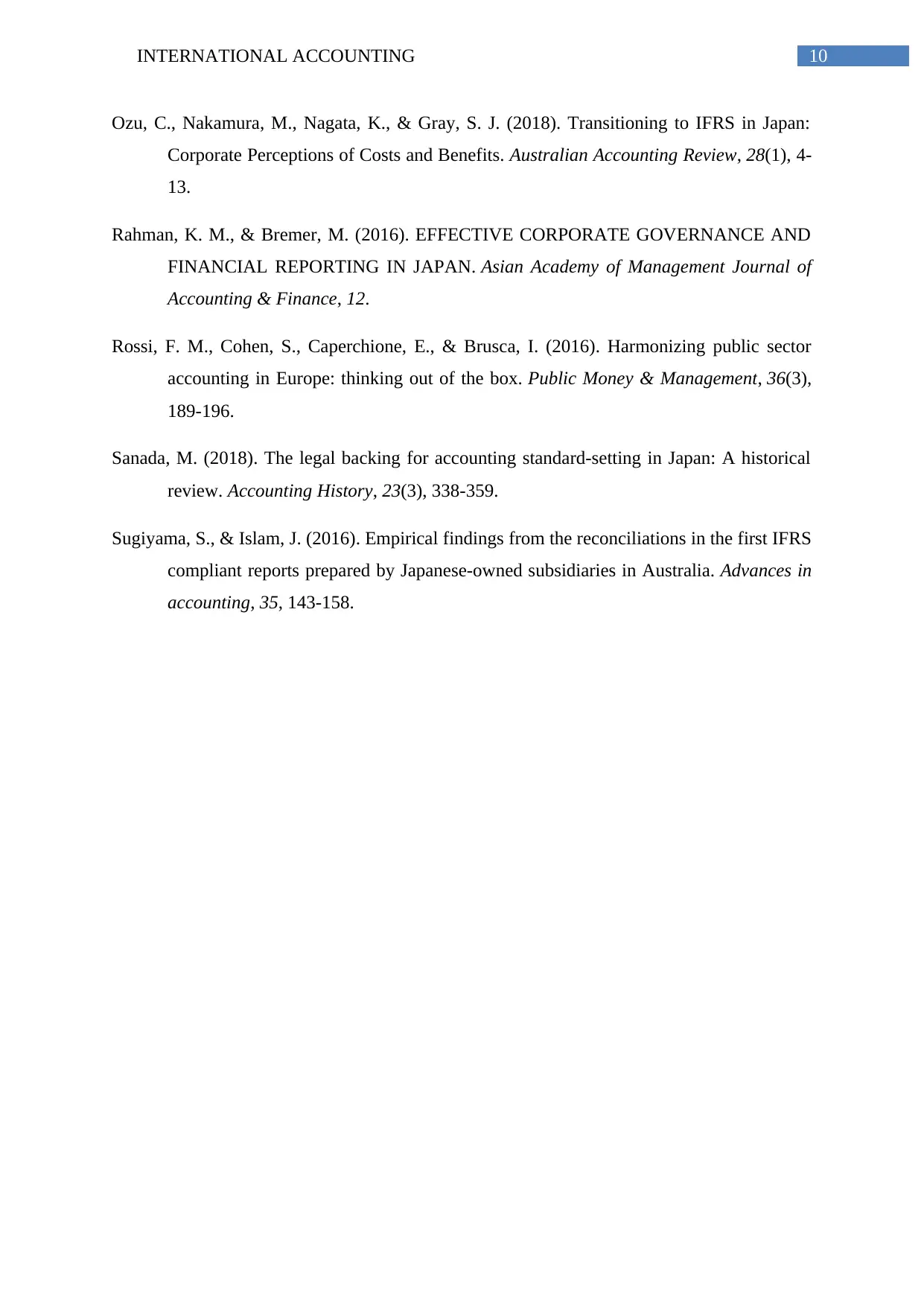
10INTERNATIONAL ACCOUNTING
Ozu, C., Nakamura, M., Nagata, K., & Gray, S. J. (2018). Transitioning to IFRS in Japan:
Corporate Perceptions of Costs and Benefits. Australian Accounting Review, 28(1), 4-
13.
Rahman, K. M., & Bremer, M. (2016). EFFECTIVE CORPORATE GOVERNANCE AND
FINANCIAL REPORTING IN JAPAN. Asian Academy of Management Journal of
Accounting & Finance, 12.
Rossi, F. M., Cohen, S., Caperchione, E., & Brusca, I. (2016). Harmonizing public sector
accounting in Europe: thinking out of the box. Public Money & Management, 36(3),
189-196.
Sanada, M. (2018). The legal backing for accounting standard-setting in Japan: A historical
review. Accounting History, 23(3), 338-359.
Sugiyama, S., & Islam, J. (2016). Empirical findings from the reconciliations in the first IFRS
compliant reports prepared by Japanese-owned subsidiaries in Australia. Advances in
accounting, 35, 143-158.
Ozu, C., Nakamura, M., Nagata, K., & Gray, S. J. (2018). Transitioning to IFRS in Japan:
Corporate Perceptions of Costs and Benefits. Australian Accounting Review, 28(1), 4-
13.
Rahman, K. M., & Bremer, M. (2016). EFFECTIVE CORPORATE GOVERNANCE AND
FINANCIAL REPORTING IN JAPAN. Asian Academy of Management Journal of
Accounting & Finance, 12.
Rossi, F. M., Cohen, S., Caperchione, E., & Brusca, I. (2016). Harmonizing public sector
accounting in Europe: thinking out of the box. Public Money & Management, 36(3),
189-196.
Sanada, M. (2018). The legal backing for accounting standard-setting in Japan: A historical
review. Accounting History, 23(3), 338-359.
Sugiyama, S., & Islam, J. (2016). Empirical findings from the reconciliations in the first IFRS
compliant reports prepared by Japanese-owned subsidiaries in Australia. Advances in
accounting, 35, 143-158.
1 out of 11
Related Documents
Your All-in-One AI-Powered Toolkit for Academic Success.
+13062052269
info@desklib.com
Available 24*7 on WhatsApp / Email
![[object Object]](/_next/static/media/star-bottom.7253800d.svg)
Unlock your academic potential
© 2024 | Zucol Services PVT LTD | All rights reserved.





